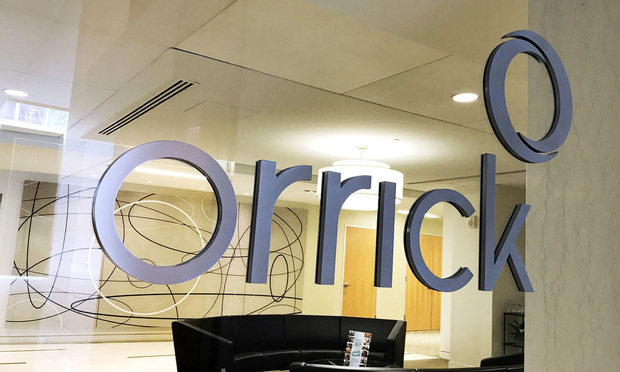In this week’s Law Firm Disrupted we ask a question: How could law firms change their governance models to incentivize long-term planning?I’m Roy Strom, the author of this weekly Law.com briefing, and you can send me your ideas here: [email protected] . ➤ ➤ Would you like to receive The Law Firm Disrupted as an email? Sign up here. 
Can Law Firms Think Long Term?
John Bautista is professionally and financially interested in a theory of corporate ownership that says shareholders who hold stock for a longer time are more interested in the long-term health of a company than those who hold their stock for a short time.That’s because Bautista is a shareholder and director at a startup stock exchange called, what else , the Long-Term Stock Exchange . Bautista is also a leading Silicon Valley lawyer and member of the board of directors at Orrick, Herrington & Sutcliffe, where, believe it or not, he is also investing in a law firm’s long-term future.Let’s start with the stock exchange.In order for companies to be listed on the Long-Term Stock Exchange, or LTSE, they must agree to some unusual governance standards designed to promote long-term investing. A single share’s voting power can be ratcheted up based on how long it’s been held by the same person (or entity). Quarterly guidance has been replaced with annual guidance. Executive compensation must be tied to performance over a period longer than a year. ( Learn more here .) LTSE founder and Orrick client Eric Ries has written that “the current incentives in the public markets stymie growth, innovation and value creation.” He goes on: “We need a new approach to governance that benefits both companies and investors.”Short-termism is an oft-cited reason for law firm partners’ reluctance to embrace new types of legal service delivery models. Half of them (pick your number) will retire before the market has changed enough to dramatically affect them.I mentioned the disconnect between working equity partners and law firm management just last week when I suggested that managing partners who are frustrated at the slow pace of change within their organization should be agitating for their partners to act something like “activist shareholders.”I’m well aware that no CEO would want to be besieged by the likes of Bill Ackman calling their company a Ponzi scheme. But law firms, of course, are not publicly traded corporations. Their incentive structures and time horizons vary as much as their individual partners.So I put the question to Bautista: How can law firms change their governance or financial structure to incentivize more long-term thinking? ( Send your ideas! )His first answer was to suggest law firms go the path of investment banks, changing from the partnership model to publicly traded companies. We can save that for another day. (It’s a long summer.)For now, I can tell you what a partner says and does when he or she believes long-term change is coming to the legal industry, as Bautista does.Here is what they will say: “ Law firms generally are looking at more immediate opportunities rather than long-term opportunities. I think a lot of law firms are going to suffer because their business models are going to change: The way we deliver legal services; the way we price them; the people we have in the organization; data analytics. All of these trends have not really hit the legal system in a systematic way yet. I believe, and I’m sure there are many who will debate this on the other side, that our industry is going to be transformed. I’m not sure you can say when, but when it does happen, we’ve seen in other industries that it happens very quickly. And those that have been thinking long term about it will reap the benefits. ”What are some of the things that Bautista and Orrick have been doing with the long term in mind?In short, Bautista has been a leader in Orrick’s effort to automate common legal advice for startup and emerging growth companies. In an example from the LTSE, Bautista, Orrick and the startup exchange launched this week a free online questionnaire that lets companies assess how ready they are to go public.Bautista is also an adviser to a company called Clerky , which was spun out of Orrick and is now led by Orrick alum Darby Wong . Clerky automates the generation of documents related to fundraising, hiring, forming companies or commercial contracts. Captable.io is an online tool; part of LTSE; and another Bautista-advised business that helps companies manage their equity ownership.Orrick has also partnered with Stripe Atlas, another online resource for corporate founders, by providing an entire legal guide accessible to Stripe Atlas members.Bautista said these kinds of partnerships are difficult for most firms to accomplish, as they require different skills than most law firms have invested in. Orrick has three full-time software developers on staff who helped build the tools. Bautista has also sought to streamline the interior work of Orrick lawyers.Silicon Valley associates no longer work on the due diligence of onboarding new clients, he said. That is handled for the office by lawyers in Orrick’s Global Operations Center in Wheeling, West Virginia, which can do the work at one-third the cost. Bautista predicts that practice will spread to other offices and practices soon. He also foresees Orrick opening similar operations centers in California—potentially Sacramento—and Europe.“We look for anything that’s repeatable, anything that’s scalable, anything that can be put into a flow chart and we ask, ‘How can we automate this process?’” Bautista said. “We’re investing in a long-term strategy here.” A note to readers: Roy Strom is on vacation next week and there will be no Law Firm Disrupted. Enjoy the fireworks.




